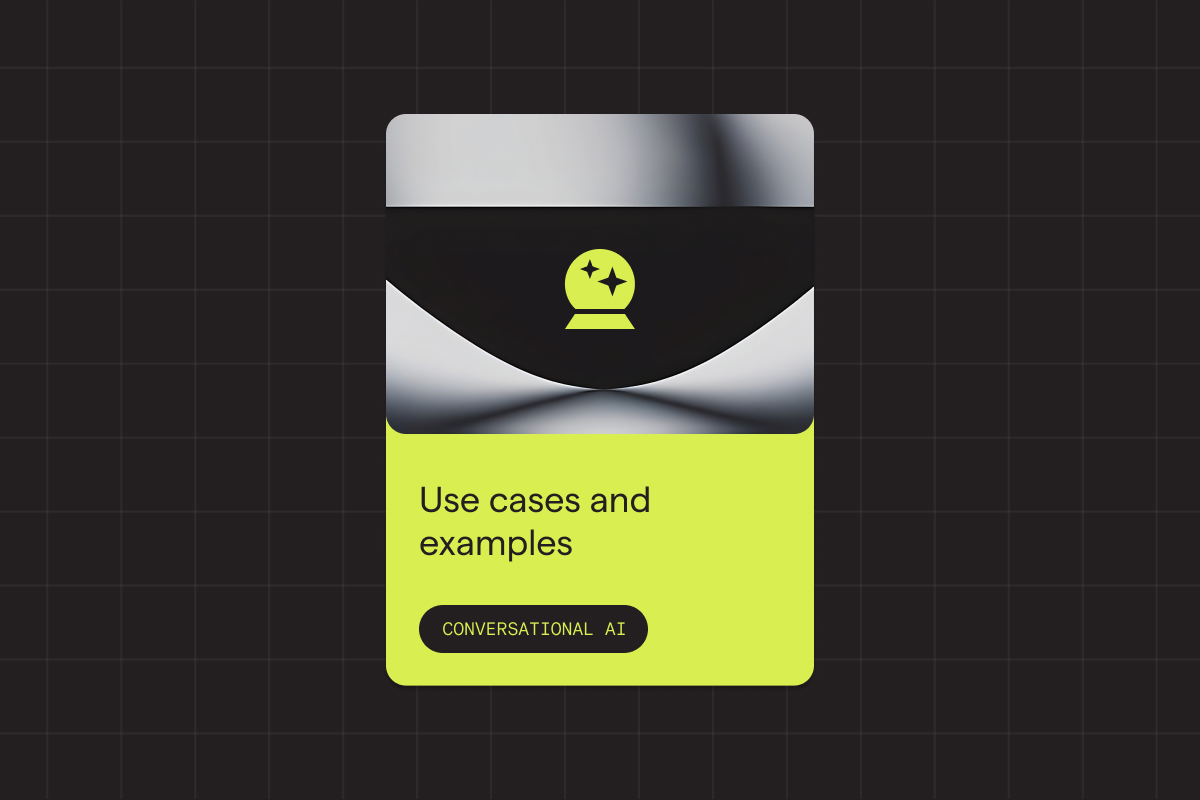Key Takeaways
Improve customer service efficiency
Conversational AI automates tasks like account management, order processing, and billing to reduce wait times and allow your agents to focus on more complex issues.
Industry-specific AI solutions
From automating hotel and restaurant reservations to speeding up insurance claims and banking services, conversational AI improves customer experience and reduces operating costs across various industries.
Enhance personalization and customer satisfaction
By integrating with CRM systems and your existing tech stack, AI assistants can recognize returning customers, offer personalized service, and speed up issue resolution based on previous interactions.
Conversational AI transforms how businesses interact with customers by enabling more natural, efficient, and automated communication. Using a unique technology stack, conversational AI can carry out conversations that mimic human interaction, making it easier for users to get the information or help they need.
Examples of conversational AI in technology
As a consumer, there’s a high chance you’ve interacted with technology that uses conversational AI to carry out tasks for you. Some examples include:
- Chatbots: Customer support chatbots found in apps or on websites
- Smart assistants: Like Google Assistant or Amazon Alexa
- Voice assistants: Customer support voicebots that handle customer queries over the phone
Use cases for conversational AI
Advances in conversational AI now enable natural, intelligent conversations between machines and humans. Multi-turn conversations, accurate recording of names and account numbers, and the freedom for users to speak openly have opened new possibilities for automating tasks and boosting efficiency across your organization. Here are some use cases for conversational AI.
Customer support
Conversational AI in the contact center enables your business to fully or partially automate common customer queries or transactions, freeing up customer service agents, reducing wait times, and serving customers quicker while gathering in-depth customer insights. You can use conversational AI in a contact center in the following ways:
- Account management: Chatbots and voice assistants can help customers change their details, upgrade their accounts, and learn more about account services.
- Order management: Customers can use voice assistants and chatbots to place, track, edit, or cancel orders. These bots integrate with your technology to identify callers, pull real-time updates, and make edits directly within your backend systems.
- FAQs: Repetitive and routine queries can be handled by voice assistants and chatbots to free up your agents and allow them to focus on customers with more complex queries. Effective voice assistants can also work with your existing self-service channels to direct customers to useful online resources via SMS or email.
- Billing and payments: Voice assistants can securely handle payments to free up your agent’s phone lines.
- Personalized service: By integrating with your existing technology stack, including your CRM, voice assistants, and chatbots can recognize return callers based on name and order numbers, making issue resolution much quicker.
- Customer data and insights: When customers can speak how they want, it creates more opportunities to record their needs in greater detail. Voice assistants and chatbots can create insights into when and why customers are calling, where there are inefficiencies in your processes, and how you can enhance service offerings to improve customer experience.
Boosting marketing impact
Your marketing teams spend a lot of time and resources on customer research when the insights they need are already within your organization. Every time a customer interacts with conversational AI solutions like voice assistants, insights are generated from the conversation. These real-time insights help your marketing team adjust strategies quickly and ensure campaigns stay relevant.
Supporting marketing campaigns through the contact center can be an operational nightmare, as agents need in-depth training to get on board. If you use conversational AI to automate phone calls, you should be able to support campaigns much more efficiently than you can by training your entire team.
Creating a competitive sales advantage
Your contact center captures customer behavior and trends as a frontline observer, gaining real-time insights into their preferences, concerns, and reactions to products and services.
Sales teams can use these insights to identify potential upsell opportunities and create processes to deliver more value to your customers and your business.
Whether you’re handing calls over to sales agents at critical opportunity points or using AI to trigger upsell protocols based on customer behavior, you can drive revenue without distracting your agents from the task at hand.
Improving digital CX and your service offerings
Whether a website bug is causing issues, your app is down, customer transactions fail, or log-in errors are a repeat problem, your customers will phone and tell you about it. When you implement conversational AI to handle customer service interactions, you can highlight friction points within digital customer journeys and work with digital teams to create better, more user-friendly, and accessible experiences for every customer. You’ll also build a picture of customer preferences that help to develop better products and services that meet their needs.
Guide
Build vs Buy:
A clear overview of the technology, resources needed, and purchasing options for voice AI.
Get the guide4 examples of ways conversational AI is making a business impact in different industries
Customers are always looking for more efficient, simple, and personalized ways to interact with their favorite brands. Conversational AI is helping businesses across industries meet these expectations by streamlining routine tasks and resolving customer issues efficiently. Here are 5 examples of how conversational AI is making a business impact across a variety of industries.
1. Simplifying restaurant reservations
Most restaurants miss a significant portion of phone calls. On-site staff are typically too busy helping the guests in front of them to pick up the phone, and when they do, they’re not always able to give the caller their full attention.
Conversational AI solutions like voice assistants can be deployed in restaurants to answer site-specific FAQs, offer promotions, take bookings, gather first-party data, take payments, and accurately route calls.
How Big Table Group automates £140k in reservations each month
Challenge
The Big Table Group was missing 60% of calls to their restaurants, potentially missing revenue from new bookings.
Solution
A voice assistant that answers every call, takes reservations, and answers customer questions over the phone.
Results
Big Table Group is now answering every call with PolyAI:
- Booking 3,800+ reservations worth $140,000 in revenue
2. Helping hotel guests book and enjoy their stay
Just as restaurant staff are busy focusing on the guest dining experience, hotel staff are under increasing operational pressure at the front desk and within centralized contact centers. Implementing conversational AI helps ensure guest satisfaction at every stage of a guest’s experience by taking room reservations, initiating housekeeping requests, accurately recognizing guest names, and taking payments.
How Golden Nugget automates 34% of hotel reservation calls with call center voice AI
Challenge
Golden Nugget Hotels & Casinos faced rising call volumes, reduced staff and a new challenge: managing PBX calls.
Solution
We implemented a voice assistant capable of handling complex hotel reservations through natural conversation.
Results
In just 1 month, the voice assistant processed
- 3,000 reservations for a single hotel
- generating $600,000 in revenue
3. Speeding up insurance claims processing and tailoring policies
Insurance products are often similar across providers, making it hard for companies to stand out. With conversational AI, businesses can use customer data to offer personalized service, helping them build stronger relationships in a market where switching providers is easy. Since trust is also crucial, offering tailored, reliable support can boost an insurer’s reputation and customer loyalty.
Conversational AI empowers policyholders to make claims, payments, and other account transactions through natural conversations without waiting for an agent.
Simplyhealth supports their digital transformation with PolyAI
Challenge
Transitioning from legacy systems to a digital-first, automated approach that enables effortless customer journeys.
Solution
A customer-led voice assistant designed to contain common FAQs while identifying and transferring vulnerable callers.
Results
The PolyAI voice assistant is now handling:
- 5,500 calls each week on the consumer line.
- 25% are fully resolved
4. Making financial services and banking more personal
In an industry where services often feel similar, conversational AI helps financial institutions stand out by improving both processes and customer service. AI-powered voice assistants guide customers through complex financial options, making it easier to understand products while building trust and loyalty. At the same time, elevating customer service by offering 24/7 support, handling routine questions, and assisting with more complex inquiries.
Empowering agents and enhancing efficiency with voice AI
Challenge
Effectively handle seasonal and unpredictable demand peaks while delivering engaging customer experiences at scale.
Solution
Introduce a voice assistant to answer customer FAQs, support a digital-first strategy, and connect complex customer queries to highly skilled agents.
Results
Deploying a PolyAI voice assistant has enabled Atos to:
- Reduce agent call volume by 30%
- Deliver customer service 365 days a year
- Handle the workload of up to 95 FTE at 50% of the cost
PolyAI is the world’s most lifelike voice AI
PolyAI offers the world’s most lifelike voice AI for enterprise customer service and delivers high-quality, human-like conversations optimized for customer engagement at scale.
PolyAI helps enterprises be the best versions of themselves in every customer call by consistently delivering the best brand experience, achieving accurate resolution, and uncovering data-driven business opportunities.
Discover how PolyAI can help you answer every call immediately, improve loyalty, resolve over 50% of calls, and deliver effortless CX at scale.
Conversational AI examples and use cases FAQs
Conversational AI is well-suited for industries like e-commerce, banking, healthcare, customer service, and retail. It’s used for tasks such as handling customer inquiries, managing bookings, providing technical support, and assisting with account management. Any industry that requires frequent customer interaction can benefit from conversational AI.
Yes, chatbots are a type of conversational AI. They use natural language processing (NLP) to understand and respond to user inputs in a conversational manner, often providing automated customer support or assisting with tasks like ordering products or answering questions.
Here are some current examples of conversational AI:
- Customer support chatbots: Used by e-commerce and telecom companies to answer FAQs, track orders, and resolve issues.
- Smart assistants: Devices like Alexa, Siri, and Google Assistant perform tasks like answering queries, playing music, and controlling smart homes.
- Voice assistants in call centers: Banks and utilities use AI to manage calls, handle account tasks, and process payments.
- Automated reservations: Restaurants and hotels, like The Big Table Group and Golden Nugget, use AI for booking management and payments.
- Insurance claims: Companies like Simplyhealth use AI to streamline claims and answer policy questions.






